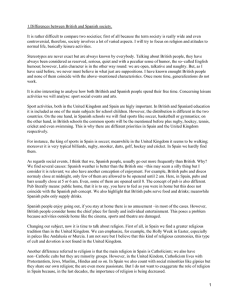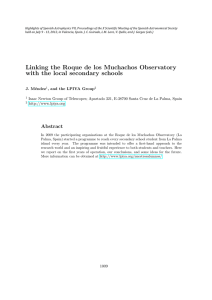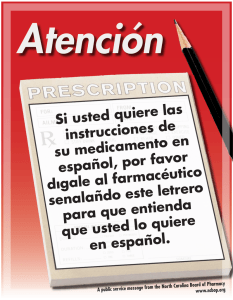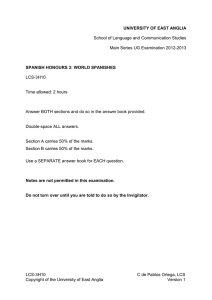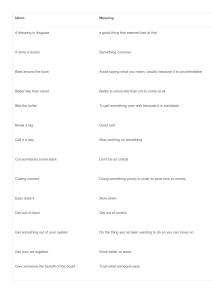Dictionary of Spanish typical expressions
Anuncio
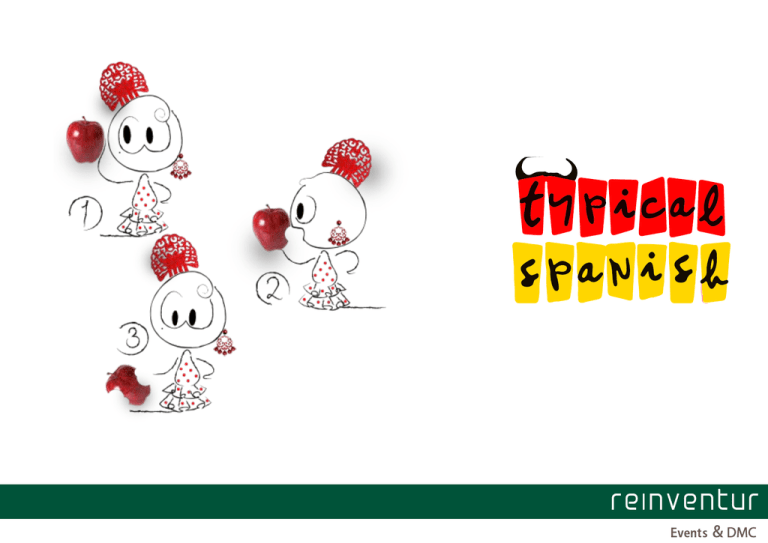
E “A mal tiempo, buena cara” This typical Spanish expression can be translated as “If life gives you lemons, make lemonade” when we are trying to explain that it is always better to have a positive point of view, but in Spain we also use the expression in the literal sense, when actually it’s raining it is better to have sense of humor and put a smile in your face. “A otra cosa, mariposa” We use in Spain this idiom for expressing that we are moving from a task to another one. It is very commonly used. “A vivir, que son dos días” This can be translated as “Live it up; life is short.” Meaning the shortness of life and we have to make the most of our lifes. It’s the Spanish version of CARPE DIEM. “Esto cuesta un riñón” Can be translated as “it costs the earth”. A riñón in Spain is a kidney, so it is logical that if you have to sell you own kidney to buy something, that thing is so expensive. This phrase can be very useful in the souvenir shops! “Dorar la píldora” This phrase can be translated as “sweeten the pill” or “to sugar the pill”. In Spain is widely used when somebody is trying to say kindly something that can hurt you (usually the truth), but we can also use it in Spain when somebody treats you better in order to obtain anything from you (this intention in Spanish we call too “hacer la pelota”) “Dormir la mona” This idiom it is not about to sleep with a monkey, that would be the literal translation. It is about when you are very drunk and you need to sleep. “La mona” in this case is your drunkenness. It can be translated in English as “to sleep it off”. So be careful with sangría if you don’t want to dormir la mona all the rest of the night long! “El mundo es un pañuelo” Have you ever met anybody from your hometown in a far country? Or even a friend or a relative that you didn’t know that was there… When this happen to a Spanish person we use to say “el mundo es un pañuelo”. This could be translated in English as “it’s a small world” “Más vale tarde que nunca” It means exactly the same as “Better late than never”, so you know…It’s never late for something great, as coming to Spain! “Ponerse las pilas” If we translate this idiom literally to the English it would mean something like “to put the batteries on”, but in Spain we use this term as “get cracking” or watch out, smarten up…etc. We use this phrase very often and in general in imperative “¡ponte las pilas!”. Now you know a lot of Spanish idioms and common phrases…¡Ponte las pilas y ven a vernos! (Get cracking and come to visit us!) “No dejes para mañana lo que puedas hacer hoy” This idiom means in english “Don't leave for tomorrow what you can do today!” and we really love this expression, specially moms talking their children to do their homework! So don’t leave for tomorrow coming and visiting our wonderful country!” “Pasarse tres pueblos” In general Spanish people tend to exaggerate when talking. And we use this idiom to express that a person that we are talking about was very exaggerate. For example, if somebody ate a normal menu and he says “I ate almost a whole cow” you can say it to him “¡te pasas tres pueblos!”, because it is not true that he ate that much. The expression is also used when somebody goes too far with his reactions. So it is a very very common idiom in our country. “Perder el norte” When somebody is “perdiendo el norte” is actually “losing his way” or just going mad. We also use this idiom in Spain when we are starting to exaggerate or starting to think strange things when we are dealing with an important matter. “Que aproveche/ buen provecho” This expression is very commonly used in Spain. We use it as the French “Bon appétit”, but in our country the difference is that if we are in a restaurant and we go in/go out of the dining room and we pass in front of a table where the people is already having a meal, even if you don’t know them at all, is common to say “que aproveche”. So don’t be shocked if you are having a meal in a Spanish restaurant and a totally estrange says to you “¡buen provecho!” you only have to say “¡Gracias!” “Que me quiten lo bailao” Maybe this is one of most typical Spanish idioms, especially because is written how it’s pronounced, missing a “D” between the last “A” and “O”. It is used when you want to express that the suffering that you are feeling now is worth because before the suffering it was great and it will be great again, someday. A silly example about this: You are on Monday in the office and you have a terrible hangover because of yesterday’s party and you think “que me quiten lo bailao”, yesterday it was amazing, a bit of hangover is not going to kill me! All the Spanish optimism in just one phrase! “Quedarse a cuadros” This phrase is used when someone is unresponsive, or does not understand what other people say, or just does not react to any situation. An easier way to put it is that someone is shocked, astonished or very surprised by something. Some of the most stunning Spanish monument can shock you so that you “te quedas a cuadros” “Quedarse frito” The literal translation of this phrase in English is “to stay fried” but it doesn’t mean that at all. In Spain when someone “se queda frito” means that he falls asleep, normally due to exhaustion. You can fall asleep maybe after an excursion or after doing sports “Quedarse con la copla” When somebody in Spain “se queda con la copla” we are not talking about the famous musical genre, it is an idiom which means that somebody understands perfectly an explanation or even that understands the hidden meaning of that explanation (in the case that there is a hidden meaning or intention). The origin of this phrase comes from some years ago, when the popular songs “coplas” where used for protesting about something but in a discreet way, always using double sense words, and the people that understood the real intention of the song “quedó con la copla” “Me estás tomando el pelo” We can translate this literally like “You’re taking my hair”, but actually in English it means “You’re pulling my leg”, and it is used when somebody is trying to trick you or even when you are so shocked about a comment that you can’t believe it “Irse con la música a otra parte” When someone says “me voy con la música a otra parte” he is not saying that is going to carry the music, the CD player or the mp3 to another place. This idiom is simply used when you know that you’re not welcome somewhere and it’s a creative and soft way to say “ok, I know I have to leave…” “Mi media naranja” If you are speaking with someone and he or she is talking all the time about his/her “media naranja” (half orange) it doesn’t mean that that person is hungry, no! he/she is talking about his/her “better half”…That person is in love! “Por la boca muere el pez” This one is another typical expression very used daily in Spain. It can be translated as “loose lips sink ships” and it means that when you talk about anything and everybody you can get in trouble…it is better to be discreet. “Ponerse morado” The literal translation of this idiom is “becoming purple”, but it doesn’t describe a people color change, in Spain we use it for expressing when someone had eaten too much. The origin of the phrase comes from the illness cyanosis or ans man, originated by a lack of oxygen in the blood. This can be produced because of a big meal, and this is the reason because Spanish people “se pone morado” every Christmas. “Romper el hielo” Maybe you come to Spain, and maybe you see a Spanish person and you like it, but you don’t know how to speak with him. In that case you don’t know how to “romper el hielo” or “break the ice” between that person and you…Don’t be shy and talk, Spanish is very nice people! “Saber a Gloria” When you are in a Spanish restaurant, almost everything will “taste divine” and that is the exactly meaning of the idiom “saber a Gloria”, try the Spanish omelet and you won’t eat another thing because ¡Sabe a Gloria! “Ser pan comido” This phrase is commonly used when you want to express that something is “like falling off a log” or “easy peasy, japanese”. For example, speaking Spanish “no es pan comido” (is not easy at all), but making Spanish friends “¡es pan comido!”. “Ser un gorrón” This idiom is very very typical in Spain, and it’s very useful too. Literally translated means “being a big hat”, but the real meaning is in its origin. From XVI to XVIII centuries, university students wore big hats as their college uniform. They used to be very cheeky and they sneaked in weddings and other parties without invitation. Nowadays we use the phrase to allude to those people that always get that other people pay their drinks or go to the parties without invitation. Be very careful with “gorrones” they can be everywhere! “Tirar los tejos” This expression has got a historical origin too. When there was not TV or electronic entertainment, children used to play with stick and stones that they found in the road. They also played with little pieces of tile (teja in Spanish) and soon playing with the pieces of tiles received the name of playing “tejo” and was similar to play boules. The kids when saw a little girl that they liked, tried to reach girl’s feet with the piece of tile, in order to get closer to her for picking the tile up, and use it for talking or smiling her…And that’s because nowadays when somebody is trying to flirt with you, we say that this person is “tirando los tejos” “Tirar la toalla” This idiom is used when somebody surrender. It comes from the boxers, when they cannot continue the fight; their coach has to throw the towel in the ring. It can be translated as “throw in the towel” “Tener enchufe” When you hear a Spanish talking about another person and saying that is an “enchufado” or “tiene enchufe” he is not talking about plugs and sockets (that is the literal translation), he is talking that the other person has got friends in high places or connections. We use to say this in a pejorative way. “Ser un aguafiestas” Do you know anybody that always ruins the party or the amusement? I’m sure everybody knows at least one person like that. So, in Spain we call those people “aguafiestas” (that literally translated is water-party) and means to be a spoilsport, a Grinch, a killjoy…etc. But why “water-party”? Because in Spain we love to celebrate parties and holy days outside and the rain can definitely ruin the party…So when you come to Spain, don’t be an “aguafiestas” and enjoy! Welcome to our house, we were waiting for you Address Paseo Infanta Isabel, 3. 28014 Madrid Spain Contact Email: [email protected] Twitter: @Reinventur Phone: +34 91 112 48 00 E
